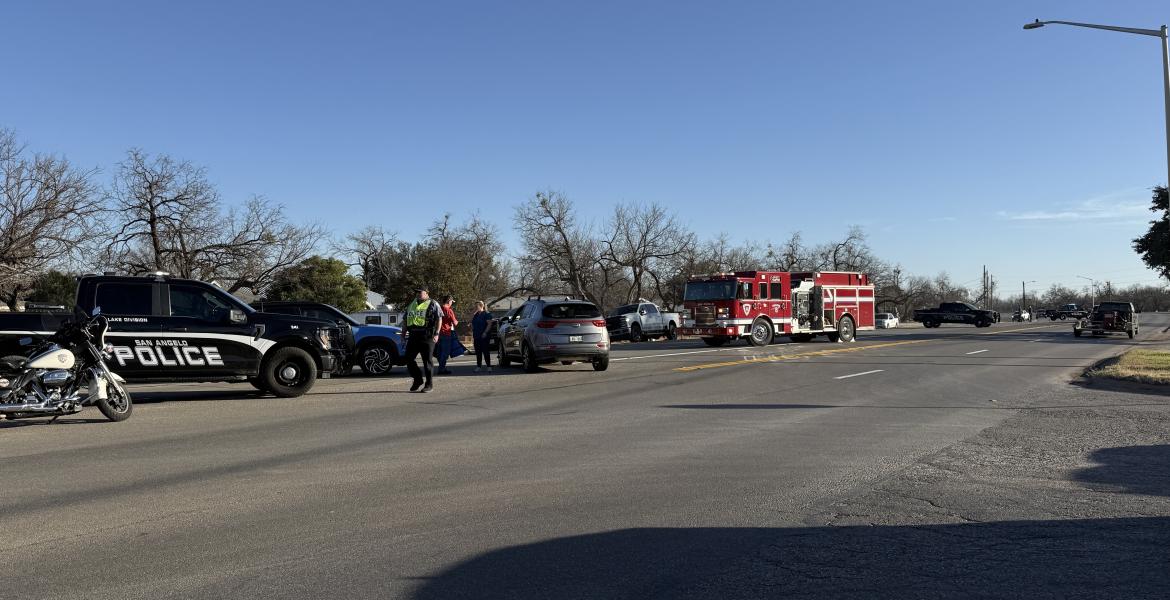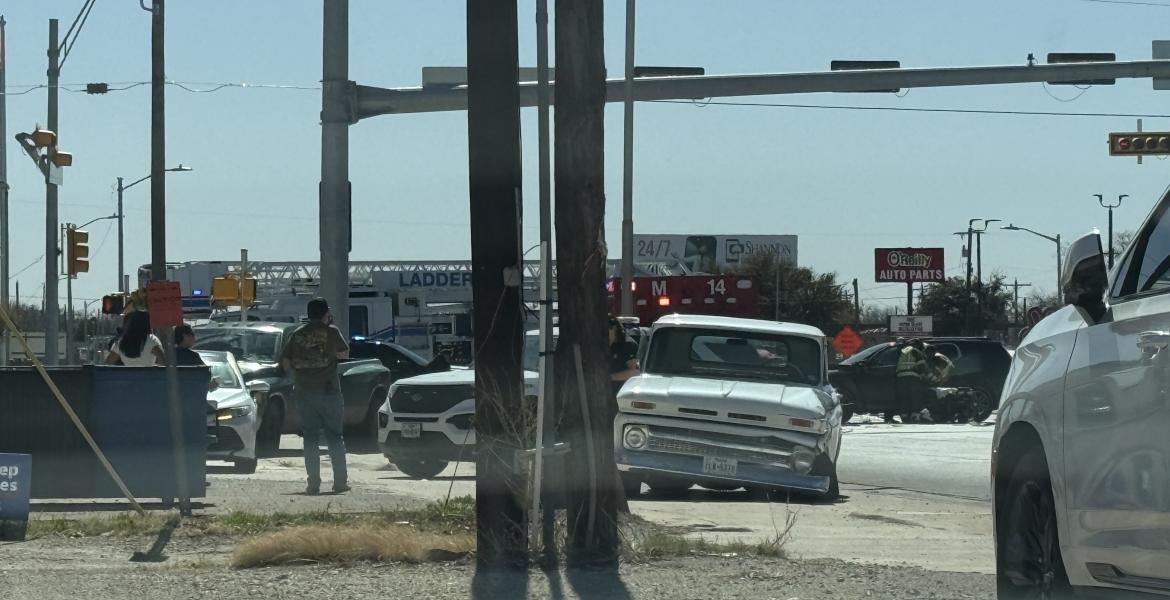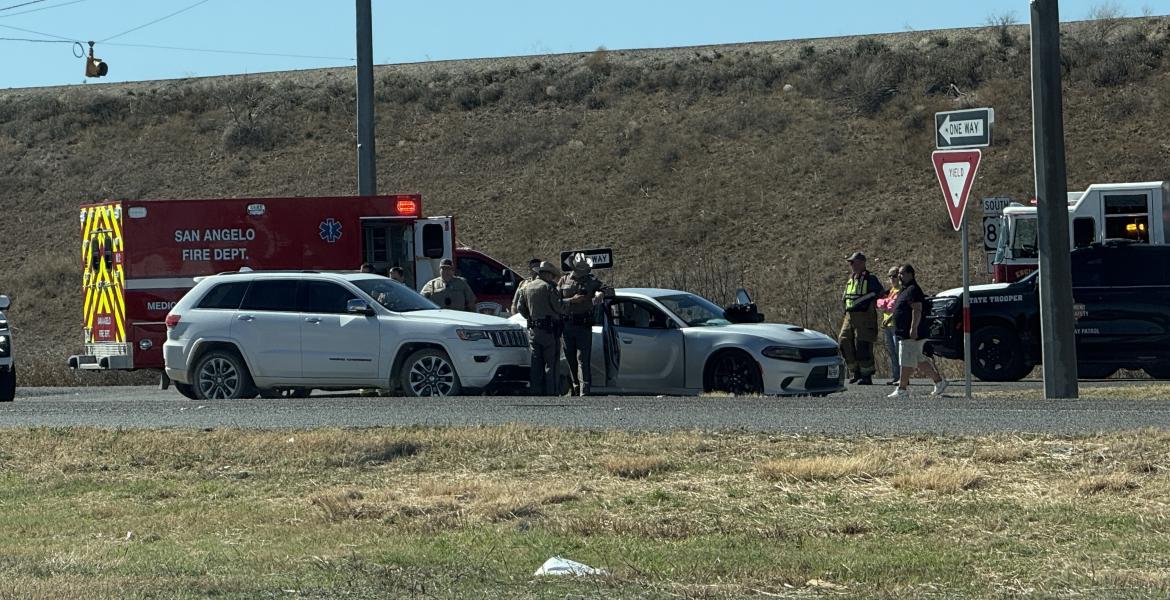Victoria Brower was sitting behind the wheel of her Yellow Checker Cab in a San Angelo parking lot on Wednesday, Jan. 14, when her phone rang.
It was 3 p.m. and she’d been furiously checking news sites all day to see if the names of the victims had been released. Her cousin, Michael “Shawn-Shawn” Stewart was an inmate at Abilene’s Middleton Unit and was scheduled for transfer.
“I saw it on Facebook that it had happened,” she said, recalling the stream of shared posts with the words “fatal TDCJ prison bus crash” in the headlines. “I thought, ‘Oh my gosh, my cousin Shawn-Shawn is in Abilene.’ I knew he was supposed to be going to prison—I didn’t know where, I didn’t know El Paso—and I just kept thinking, ‘Oh my gosh, what if he was on there?’
Brower said she next called her son and relayed her concern to him, and then continued to try and find information on who was on the bus, to no avail. When her cousin Miranda called to relay the tragic news that afternoon, Brower was sick with grief.
“For some reason, I already had a feeling. I already knew, you know, in my gut,” she recalled. “The first thing I said was, ‘I knew it! I knew it!’ and then I started crying.”
As she waited on her fare to enter the parking lot and climb in her cab, Brower lost it and began crying uncontrollably. Her cousin, Shawn-Shawn, was like a brother, she said, and he was only 25 years old.
“Thursday I went to work and everybody was talking about it,” Brower said. “It was on the front page of the paper and it was on the news, on the radio and everybody was talking about it. I would get in my cab and I just—I couldn’t handle it. So I had to go home that day, too.”
In the aftermath that followed the crash of the Texas Department of Criminal Justice transport bus on Jan. 14, Brower’s family, and those of seven other minimum security inmates, began what she described as a confusing and devastating quest for information as they battled the grief of loss.
“If one of my other cousins just passed away or something, I would know everything. I would know exactly where the funeral was, exactly where they were, you know, I would know everything. With this one, it was so hard to try and find out, you know, where the body is, when are we going to have the funeral, when are we going to go down there? It’s just so hard because we don’t know anything,” she said, exasperated. “They weren’t trying to let us know anything. It’s like they don’t even care about the inmates’ families.”
As a cousin and not immediate family, Brower’s access to information was minimal and secondhand. Next of kin notifications don’t extend through the branches of the family tree, and personal information on autopsies and state-funded funeral arrangements were more rumors than facts for family not in direct contact with the TDCJ.
Ultimately, the family’s Stephenville funeral home agreed to work out the arrangements with them and retrieved Shawn’s body from autopsy in Fort Worth last week, Brower said. He will be buried in a plot next to his father, who died roughly a year and a half ago.
“We called him Shawn-Shawn because he’s actually a junior,” Brower explained. “His father is Michael Shawn Stewart also, and we always called him (father) Shawn, so when he was little, we called him Shawn-Shawn.”
Brower and her family grew up in Stephenville and Shawn grew up in nearby Haltom City. The two were actually second cousins, but since his father was so much older than she was, they became very close.
“My grandmother, she lives out in the country,” Brower said. “She lives in this community and there’s a lot of county roads and stuff. We’d go for walks and stuff and there was a little bit of land next to my grandmother’s and they would go out there and throw the football around and she had a basketball goal out there and stuff.
“[She] would always take us to the little restaurant there in town—all of us kids—and they (Shawn and his brother Justin) were closer to our age,” Brower said. “Growing up, he was just a sweet, kind little boy.”
Brower and her cousin Shawn remained close throughout the years and they grew older, but around six or seven years ago, she said, he started to get into trouble and delved into the underworld of drugs. The family still saw each other on holidays and reunions, she said, but Shawn slowly drifted apart.
In 2003, Brower moved from Stephenville to San Angelo with a friend who was attending ASU, and soon met her current husband. Despite the distance and Shawn’s increasing trouble with the law, the family remained close and she was determined to help him get back on the right path.
“Every holiday—I mean, we’re adults now and I live here in San Angelo, but—every holiday, like Christmas and Thanksgiving, the whole family is at my grandmother’s and we have a big family dinner and I see them a lot,” she said.
“I tried to talk him into coming here when he was starting to get in trouble. I told him, ‘Come out, stay with us. You can get a job and get on the right track.’ I tried talking him into it, but he wouldn’t do it.”
In 2014, Shawn didn’t come home for Christmas. He’d been sentenced to four years in the TDCJ for stealing items from Home Depot and having someone return it for cash, then fled from an officer in a vehicle.
Although his projected release date was Sept. 1, 2016, he would have been eligible for parole on April 14, 2015, if he remained out of trouble while in prison, and Brower said she believed he intended to do just that.
“With him being in the prison, my other cousin, he had written her and told her how sorry he was for everything he had done and put the family through and he was going to get his life back on track,” Brower said. “He was going to not get into trouble anymore, you know. He wanted to rehabilitate. He did want to actually do better.”
After making parole, Shawn was likely to return home to live with his mother, who he had been caring for since the death of his father, Brower explained.
“His mother and his brother care deeply for him and once his father passed away; he was the main breadwinner,” she said. “He was the one that took care of his mom.”
In the wake of her cousin’s death, Brower said the biggest difficulty the family has been facing is determining how to proceed with funeral arrangements on the promise of support from the TDCJ.
The families of the two officers killed in the crash, 53-year-old Christopher Davis and 45-year-old Eligio Garcia, will receive $6,000 from the state of Texas Risk Management office to put toward funeral expenses, in accordance with state law for officers killed in the line of duty.
“The state office of risk management handled the employee side, so that’s just referring to the correctional officers that were killed,” Clark explained. “Given the circumstances of the accident, TDCJ is going to go cover up to $6,000 for the offenders’ funeral and burial expenses.”
Clark said the TDCJ is still working through the details of how they will be issuing funds as reimbursement for funeral costs, however he believes that they will ask families to send invoices from the funeral homes and then the TDCJ will issue a check of up to $6,000.
All of the bodies were transported to Fort Worth for autopsy following the crash, and the officer’s were sent to Abilene, where their families have made funeral arrangements. Families of the prisoners will have to make arrangements for their deceased in accordance with the state contracted services. The funeral home in Stephenville drove to Fort Worth to retrieve Shawn’s body.
Given the unclear circumstances surrounding TDCJ’s reimbursement, several of the inmates’ families have announced they plan to file lawsuits for monetary relief, Brower said. Although the sudden death has put a strain on her family, she said their goal is not to make money off of the tragedy.
“A lot of these families are suing and we’re not,” she said. “We don’t want money for this. All we wanted was a little bit of help to see if the community would come together to help us pay for his funeral. We’re not trying to get thousands and thousands of dollars from the government or anyone, we just want help burying him.”
Shawn’s family has since set up a gofundme account and received information regarding the reimbursement from TDCJ, but are still struggling to finance the funeral without the additional assistance.
“We weren’t ready for this. We weren’t, you know. We’re a broke family. We don’t have a lot of money,” she paused, emotional. “And his mom, he was the one who was trying to take care of her.”
Brower last saw her cousin, Michael Shawn Stewart, in September 2014, when her great aunt came down from California for a family reunion at her grandmother’s. She remembers him being quiet and to himself at that time, probably aware his actions would soon land him behind bars, but this is not the memory she keeps.
“I just think of the times we were out there at my grandmother’s together,” she said. “I just think about how when he was younger and how free he was and how he used to play with all the other kids. That’s the only thing I can really think of.”
As the family copes with the loss of their loved to a horrific tragedy, Brower said one of the biggest difficulties has been overcoming the negativity of strangers. Having read countless reports and even more comments on news and social media sites, Brower is appalled at the “horrible, horrible things” people are saying about her cousin and the others on that bus.
“They’re people, too,” she insisted. “They have families. Just because they did something wrong doesn’t mean that we don’t care about them. It doesn’t mean that we love them any less. They would be the same way if it happened to one of their family members. You can’t control what your family does. You can’t control people. It’s not our fault that he did what he did, but he is still a person. He is still my cousin and I still love him. They’re not just inmates, they’re not just a number.”
Brower set up a gofundme account to seek support in funeral and other expenses as the family grieves through the loss of Shawn. So far, she hasn't received any donations. If you'd like to contribute, follow this link.
Subscribe to the LIVE! Daily
Required






Comments
Listed By: J D
I don't think the community will be very open minded about helping to bury a prisoner, unfortunately. I realize he wasn't a hardened criminal... but still. I mean - WONDERFUL if they do manage to get the money in the end, I just don't think it will happen.
Sure, they may not have any intention of filing a lawsuit... but if you think that the people responsible for sending a bus out on an icy road should be HELD responsible - then you file a lawsuit and ask that they pay to ship your family member home. You don't have to go all in and beg for the ungodly amount of money that others deem appropriate for grief, etc (which is what I think you were trying to avoid, based off the article.) But simply file the lawsuit and ask that they do the right thing and send Shawn home.
I don't think that's too much to ask. Oh, and lawyer up, and make them pay for that too :)
- Log in or register to post comments
PermalinkListed By: Someone Special
I'm just curious why a second cousin needs donations for funeral and "other" expenses when the state is paying for the funeral...
http://www.oaoa.com/news/traffic_transportation/article_156cd6b6-9dd6-11e4-9b0a-df2eb25a62a3.html?mode=jqm
- Log in or register to post comments
PermalinkListed By: J D
The state will pay for the funeral only if they bury him in Houston. The family wants him buried with the rest of his family.
- Log in or register to post comments
PermalinkListed By: Chelsea Reinhard
The state is only paying for the officer's funerals at a price of $6,000 apiece. The state does not cover deaths of inmates, but due to the circumstances of the incident, the Texas Department of Criminal Justice has decided to give the families up to $6,000 apiece to cover funeral costs and expenses. It will come out of their budget, not the state Risk Management office.
The inmates may be buried wherever their family wishes, not just in Houston. It just so happens that the TDCJ's burial services contracts out of Houston. This means the families will have to retrieve their loved ones--as this family did post-autopsy in Fort Worth--and take them to their location of choice. The families will then make their own arrangements.
Once the funeral/burial has taken place, the families will submit invoices for the services to the TDCJ and receive up to $6,000 reimbursement. This was all clarified with the Director of Public Information, Jason Clark, earlier this week. At that time, he said he wasn't sure exactly which TDCJ office would be handling everything because they were still working out the details, but that was his explanation as to how they have talked about proceeding. It varies slightly from the Odessa American article, but initially I was given the same response you see printed there. I just wasn't clear on it and asked for more detail, in which he explained the who and the how.
- Log in or register to post comments
PermalinkListed By: J D
Thanks for that clarification, Chelsea. Goodness, the entire situation continues to be such a tragedy, all around. I hope they get everything worked out in the best interest of their family.
- Log in or register to post comments
PermalinkPost a comment to this article here: